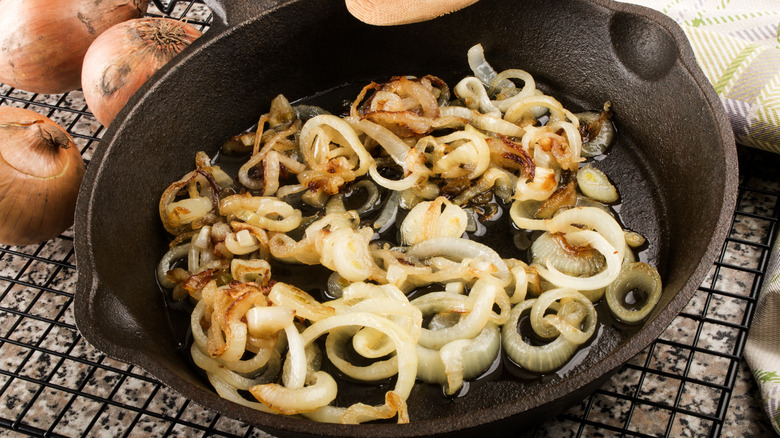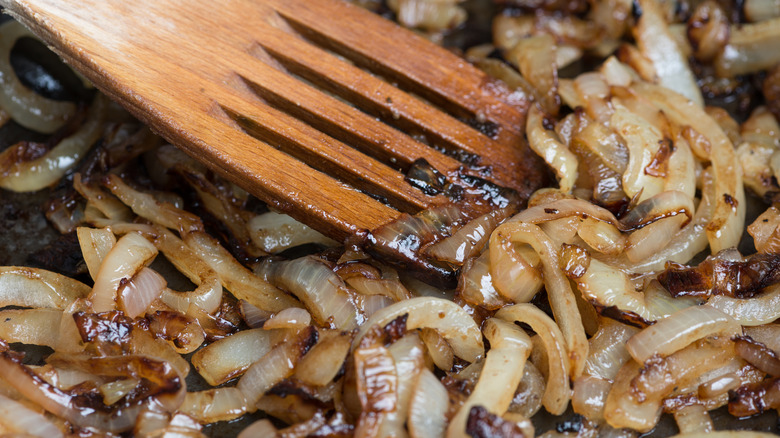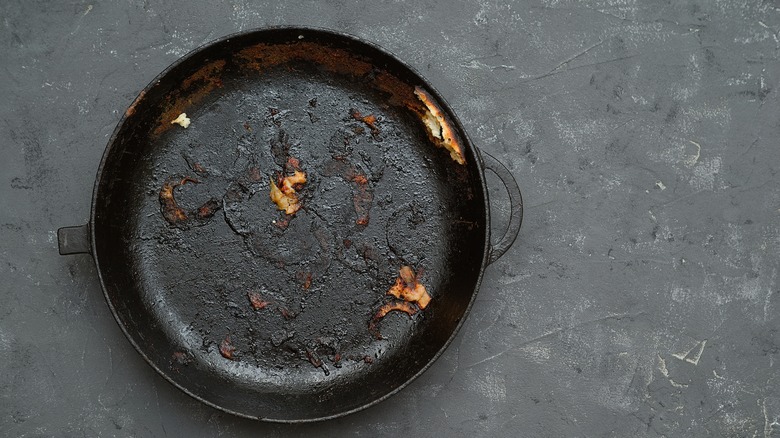Caramelize Onions In Your Cast Iron For A Low-Effort Way To Clean The Pan
To know the joys of cooking with a cast iron is to love it. There's a reason home cooks have been using cast iron cookware since basically forever. But while it can go so, so right, most of us are also aware of all the faux pas that can ruin the all-important layer of seasoning, like submerging it in water or boiling water in it for too long.
But fewer have a good handle on the dos to ensure your pan stays in glossy, tip-top shape for stick-free cooking whenever you use it. Caring for it is a tiny bit finicky but certainly low-tech — in most cases, a quick rinse, maybe some boiling water, and a soap-free scrub with a bit of coarse kosher salt are all you'll need to keep your pan clean. People can get pretty out there and fancy with their cast iron care methods to be sure, but no need. One of the most effective cleaning hacks is hanging out in your produce drawer — a plain old onion.
Caramelizing an onion in your cast iron skillet not only leaves you with a delicious pile of rich sweet onions to turn into French onion soup, but it scours any caked-off junk from the surface of your pans while they cook. The process, shared by The Kitchn, is time-intensive but relatively hands-off. If you find yourself with a pan in need of some serious rehabbing, get to slicing, and let the onions do their magic.
Onions pick up and remove fond from pans
Know that crusty gunky stuff caked onto your cast iron? Even with the best intentions and care, if you're using your pan regularly, it'll inevitably end up with some imperfections across the should-be glossy surface. Sometimes this can be easily removed with a scrubber and some salt for extra sanding power, but when stubborn bits (the technical name for these browned, stuck-on bits is "fond") aren't budging, some slow-cooked onion will save the day.
The reason? As the slices cook down, slowly, they pick up the bits of fond and remove them from the surface of the pan, leaving it glassy and good as new. Onions have all sorts of bonus cleaning purposes thanks to their inherent acidity — you can even clean a grill with a half of one. As they clean your cast iron, cooking for around 50 minutes, the flavor they'll pick up is a big bonus. Fond can be a pain when it's stuck on your pan, but it's also a benefit. If you've ever seen a recipe saying to deglaze your pan's fond, then you know — the bits are wildly flavorful and infuse recipes like stocks and sauces with big flavor, so it's something to be used in your cooking, not scraped off and tossed.
Practice good food safety and don't consume old fond
Don't fall for the numerous myths surrounding cast iron skillets – yes, you can use metal utensils with them, and no, its not unsafe to cook at very high heats with them. There's also the serious potential perk of using cast iron skillets, which is you'll pick up tiny bits of iron that flakes off as food cooks, infusing your diet with an extra boost of needed iron — a key mineral many of us are low on. Not to mention, if you're concerned about the potential health dangers of consuming the chemicals found in Teflon-coated non-stick cookware, cast iron contains no chemicals but still provides a totally non-stick surface you may even prefer.
However, don't counteract all the positive health and cooking benefits of cast iron cooking by sacrificing common sense when it comes to food safety. If you're attempting to remove days-old fond from your pan, you wouldn't want to eat the onions — they'll soak up all that browned stuff, which adds flavor along with potentially dangerous bacteria if it's been sitting out. This tip works best on a pan you just cooked with and that needs a clean, so don't risk your health. Don't forget once the onions are done to wash out your pan and immediately re-oil and heat up — a crucial step for properly seasoning any pan, old or new.


